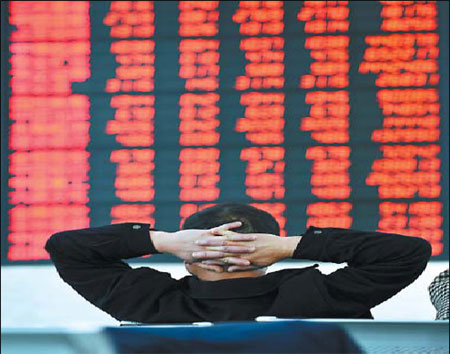Lack of due diligence makes it difficult for traders to take stock
Updated: 2011-12-14 07:51
By Gao Changxin (China Daily)
|
|||||||||
|
Companies enter China's stock exchanges with help from IPO sponsors, but then are on their own. Stocks fell on Tuesday to their lowest level since March 2009 after housing sales slumped. Shi Ji / for China Daily |
|
An Xin / for China Daily |

IPO sponsors face credibility crisis after series of scandals, Gao Changxin reports in Shanghai.
For sponsors of initial public offerings (IPO), nothing is more important than due diligence. But in China, their diligence seems due.
China's 21-year-old stock market has not been short of scandals. But, following a number of high-profile incidents involving listed companies this year, more investors are questioning the credibility of information disclosure by listed firms and the diligence of their sponsors.
Investors were shocked last month when Haitong Securities Co Ltd used the wrong company's name in its IPO recommendation letter. Zhejiang Daoming Optics & Chemical Co Ltd was applying to launch its IPO. However, a different company, which makes playing cards, was named in the sponsor's recommendation.
Earlier in November, Gu Yucun, chairman of Nanning Baling Technology Co Ltd, was reported to be under criminal investigation for embezzlement. The company had just issued shares publicly and was waiting to be listed.
China's securities law forbids a company to issue shares publicly if senior managers or major shareholders are under police investigation. Ji Yaping, Nanning Baling's sponsor representative with Minsheng Securities Co Ltd, told local media that he was "not aware of the situation".
Vouching for accuracy
The China Securities Regulatory Commission introduced the IPO sponsor system in 2004. Under the system, Chinese companies seeking an IPO on the Shanghai or Shenzhen exchange are required to obtain the endorsement of a qualified sponsor.
The sponsors are to complete a due-diligence checklist and sign a declaration that they are aware of the legal consequences before they recommend an IPO candidate to the commission for approval.
The sponsors are required to make sure financial data and other information provided in the IPO prospectus are truthful. They also continue to oversee disclosure information, to be sure it is valid, for one or two years (depending on the trading board) after the company floats its shares. It is a common practice for an underwriter to also act as the sponsor of an IPO.
"The system was aimed at improving the quality of public companies and better protecting investors' interest," said an employee with the investment banking department of a major securities company in China. The person refused to be named.
"Seven years later, the quality of listed companies has improved a lot."
Trading reversals
But has it? The recent development of the country's Growth Enterprise Board sheds some light on how the sponsor system has functioned.
The Nasdaq-style board, designed for growth companies with smaller capitalization, was launched at the end of 2009. By the end of October this year, its listings had ballooned from 28 to 247.
But now, about 70 percent of the stocks are trading below their issuing value, despite the high price/earnings ratios when they floated shares. In the third quarter this year, 78 companies reported a loss and earnings declined at a third of companies. In all of last year, earnings declined at 25 companies the same year they went public.
Xuzhou Combustion Control Tech Co Ltd went to the extreme. Last Dec 29, it floated shares at a price/earnings ratio of 80 after its earnings had grown more than 70 percent annually over three years. But its 2010 annual report, published several months later, reported that company earnings declined by 0.43 percent.
Liu Guanwu, an IPO analyst with Analysys International, a Beijing-based consultancy, said that instead of supervising IPO candidates, the sponsors acted to beef up the candidates' earnings.
"Many of the companies on the board just don't have big growth potential, though they are supposed to. The reason they enjoyed high price/earnings ratios is that the investment banks 'packaged' them into high-growth companies and made investors believe it," Liu said.
"The investment banks' interests are tied up with that of the IPO candidates. The more money the companies raise, the higher the banks' commissions."
Penalties questioned
Hua Sheng, president of Yanching University in Beijing, told a forum in Beijing last month that the main problem is the sponsor system's mild punishment of wrongdoing by sponsors and their representatives.
Regulations issued by the securities commission stipulate that if a public company's earnings decline more than 50 percent in the year went public, or if there are any irregularities in information disclosure, the IPO sponsor will be banned from doing sponsor business for three to 12 months. In serious cases, a sponsor's business license can be revoked.
Gaoxin Zhangtong Co Ltd, a tube maker, was delisted last year after reporting a loss in three consecutive years after going public. The punishment given the two sponsor representatives with Bohai Securities Co Ltd was a "notice of criticism" from the commission.
Jiangsu Qionghua High-Tech Co Ltd, whose shares are now under special treatment - which means the daily limit in price fluctuation is cut from 10 percent to 5 percent - was found to have made inaccurate statements on its prospectus just 10 days after going public. As punishment, the commission decided it won't accept IPO recommendations from Qionghua's two sponsor representatives for three months.
"The punishment should be much tougher," Liu Jipeng, a professor at China University of Political Science and Law, wrote on his blog. "The situation now is that nobody is to be blamed if there are problems. The sponsors are actually committing fraud at no risk."
The unnamed person with the securities company said that a three- to 12-month suspension means nothing to sponsor representatives, who "take on only one or two projects a year. The suspension is too short to have any substantial impact on them," the person said.
The first time the securities commission revoked a sponsor representative's license was in 2009, five years after the sponsor system was launched. The reason: Two representatives had made false statements in their applications for sponsor representative licenses.
Tougher system
Hong Kong also has an IPO sponsor system but is much tougher when it punishes wrongdoing. Sponsors face huge fines and possible criminal charges if their transgressions are caught.
For example, Hong Kong Economic Times reported in September that Mega Capital (Asia) Co Ltd faces fines of up to HK$100 million ($12.85 million) after making inaccurate statements in the prospectus of Hontex International Holdings Co Ltd.
Even in Hong Kong, where the sponsor system dates to 1999, there are flaws. Late last month, the Hong Kong Monetary Authority said it found inadequacies in the activities of five banks that sponsor IPOs in the city, including their handling of due diligence and disclosures in IPO prospectuses.
In a report, the authority said the "issues of concern" related to "the accuracy and completeness of statements disclosed in the prospectus".
How good is the exam?
At the very center of China's IPO sponsor system are the country's more than 1,800 sponsor representatives, who sign IPO application documents required by the commission.
Despite their controversial track records, sponsor representatives are among the highest paid people in the country. According to a survey by the business magazine Money Week, sponsor representatives earned an average of 6.08 million yuan ($956,000) last year. In Shanghai, one of China's most developed cities, average annual wages then were 46,757 yuan.
"The sponsor representatives' benefits and responsibilities are highly disproportional," said Liu, the professor.
To become a sponsor representative, the most important requirement is to pass the commission's annual sponsor representative exam. It is one of China's hardest exams. Last year, only one in 100 candidates passed.
But industry insiders question the exam's effectiveness.
"What it really takes to be a qualified sponsor representative is practical experience, not the ability to pass exams," said the investment banking employee. Though the commission also requires applicants to have three years' working experience, the person said it takes longer than that to fully understand the complexity of the job.
The person added that many college graduates, who are young and have plenty of time and good memories, passed the exam and several years later became sponsor representatives, even though they lack field experience. Many experienced full-time workers don't pass because they are so busy working that they don't have enough time to read the required books.
"If I had known that a license is that important, I would have quit my job to pass the exam. Now fewer and fewer people pass the exam every year because there are already so many representatives," the person said.
"To some extent, the exam seems to have had the opposite effect in selecting qualified people."
Another approach
Terence Ho, a partner at accounting and consulting firm Ernst & Young, told China Daily earlier this year that the sponsor system is only a temporary method adopted on the way to China's IPO mechanism reform.
"Eventually, China's stock issuing will go from administrative examination and approval to registration," he said.
Under the registration system, which is used in the United States, regulators check only the format of a company's information disclosure. Investors decide which companies will survive, and they correct wrongdoing through legal action.
"The registration system is a better way to protect investors," Ho said. "In the US, if a company makes false statements in its prospectus, investors will make it pay a huge price through class actions."
Following the rise of its IPO market in recent years, development of China's mergers and acquisitions market also has picked up. As a result, the securities commission is introducing a financial adviser system, a counterpart to the IPO sponsor system.
The commission is about to roll out another exam, and only those who pass it can get a financial adviser business license to sign M&A application documents for approval by regulators.
"Here comes another batch of millions-yuan-a-year jobs," said the securities company employee.
Write to the reporter at gaochangxin@chinadaily.com.cn
(China Daily 12/14/2011 page1)













